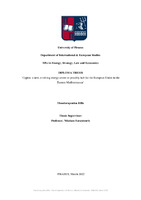Cyprus: a new, evolving energy center or possibly hub for the European Union in the Eastern Mediterranean

Master Thesis
Συγγραφέας
Theodoropoulou, Effie
Θεοδωροπούλου, Έφη
Ημερομηνία
2022-03Επιβλέπων
Farantouris, NikolaosΦαραντούρης, Νικόλαος
Προβολή/
Λέξεις κλειδιά
Cyprus ; Εnergy center / hub ; East Med pipeline ; Euroasia / Euroafrica interconnector ; EMGF ; EEZ ; Trilateral cooperation ; Monetization pathways ; Securitization ; Energy transitionΠερίληψη
This study in a multi-disciplinary approach tries to shed light on the significance of the Eastern Mediterranean, as a unique regional subsystem, ‘hosting’ an enviable, yet perplexed energy matrix, ‘levitating’ between frictions and cooperation among various actors. In particular, the initial stimulus for the research was Cyprus, a small island, overburdened with one of the most resilient international conflicts, still unresolved, which due to its geostrategic importance and its natural mineral wealth, among other things, has the potential to become a new energy center or even possibly a hub for the European Union in the Eastern Mediterranean and the Middle East (i.e. EMME). Hence, the methodology was tailor-made, based on the above-mentioned needs as a blend of analysis and synthesis of sources alongside classic international relations theories. The specific methodological tools have showcased that Cyprus is an emerging energy player moving towards an integrated regional gas infrastructure, having as a national priority, for the time being, the LNG monetization pathway- combined with other options -,that the Cypriot EU identity is a valuable asset, that Cyprus -in the post-pandemic era- will be a venerable actor within increased infrastructure interconnectivity, paving the way for an integrated regional infrastructure building capacity, as well as, actively involved in the energy transition. Lastly, they spark a broader discussion on energy-related effective policies, adaptable to the region of the Eastern Mediterranean and the Middle East (i.e. EMME), which needs to cooperate closely in three domains in order to tackle climate change and achieve swift energy- transition: firstly, in new zero-carbon energy sources- based system (i.e. namely solar and wind power), secondly, in climate adaptation (i.e. water –stress in urban areas or in the agricultural sector) and thirdly, in terms of economic competitiveness in a green, digital, innovation-driven economy.

